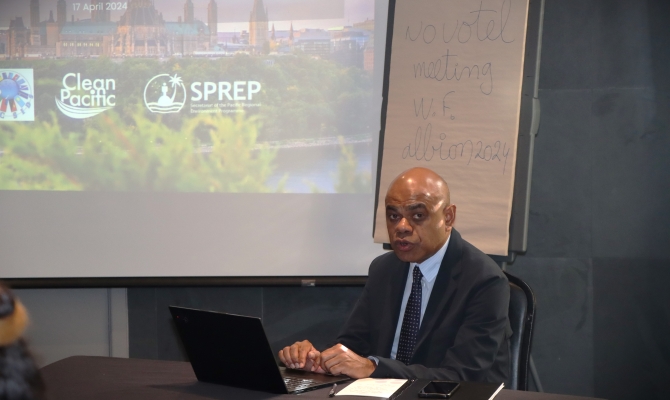
17 April 2024, Ottawa Canada - Delegates from 14 Pacific countries have descended upon Ottawa, Canada, to finalise preparations for the fourth session of the Intergovernmental Negotiating Committee to develop an international legally binding instrument on plastic pollution, including in the marine environment (INC-4), from 23 to 29 April 2024 at the Shaw Center.
INC-4 is preceded by the Pacific Small Islands Developing States (PSIDS) regional preparatory meeting at the Novotel Hotel, on 17 April 2024, where Pacific delegations advocating for the Pacific’s priorities in line with the Cleaner Pacific, met to reaffirm and align their positions as a group on the key issues.
Vanuatu, as the PSIDS Chair, urged all Pacific delegates to continue to lead by example to inspire change and redouble their commitment to work towards a world where plastic pollution is eliminated.
“As we convene to discuss one of the most pressing challenges of our time - plastic pollution, I am filled with both a sense of urgency and hope that at this stage of the negotiations, our group must continue to be ambitious in our approach,” said the Permanent Representative of the Republic of Vanuatu to the United Nations, Ambassador Odo Tevi when he opened the meeting.
The INC was formed during the fifth Session of the United Nations Environment Assembly (UNEA), when they agreed to the resolution to “End Plastic Pollution: Towards an International Legally Binding Instrument”. The first three INCs were held in Uruguay, France and Kenya respectively.
The treaty under negotiation aims to address the entire lifecycle of plastic, from extraction of raw materials to production to end-of-life of plastic products. With only one more session of negotiations scheduled for Korea later this year, the pressure is on INC-4 to make considerable progress.
This pressure was not lost on Ambassador Tevi, who said: “Our work is far from over. The scale of the plastic pollution crisis demands unwavering commitment, bold action, and collective efforts from all stakeholders.”
A revised draft text of the future treaty, containing the merged texts from Contact Group 1, Contact Group 2, Contact Group 3 from INC-3 in Kenya, will be the focus of negotiations in Ottawa where Pacific countries will advocate for an ambitious treaty that covers the full lifecycle of plastic pollution, one that is relevant and applicable to the special circumstances of SIDS.
At the PSIDS preparatory meeting, Ambassador Tevi reminded that the issue of plastic pollution is not just an environmental challenge for Pacific nations, but it has also become a threat to our very existence and the well-being of our communities.
“The Pacific Small Island Developing States have long been at the forefront of the fight against plastic pollution, recognising the devastating impact it has on our fragile ecosystems, marine life, and ultimately, on the livelihoods of our people,” he said.
“I am proud to acknowledge the commendable work that has been done by our former chairs, member states and partners in addressing this critical issue. Through innovative policies, community initiatives, and international collaborations, we have made significant strides in raising awareness, implementing sustainable practices, and advocating for change on a global scale.”
The Secretariat of the Pacific Regional Environment Programme (SPREP) continues to work with the Governments of Australia and New Zealand, and key partners, to support Pacific countries at the ongoing INC process.
“Our combined voice at the table will be essential to securing the financial resources and technical assistance we need to effectively address plastic pollution in our island nations,” Ambassador Tevi reminded.
“As the Chair of PSIDS, I urge us all to redouble our commitment to combatting plastic pollution, to protect our oceans, and to secure a sustainable future for generations to come. History is filled with examples of seemingly insurmountable problems overcome through collective action and innovation.”
The fourth Intergovernmental Negotiating Committee to develop an international legally binding instrument on plastic pollution, including in the marine environment is taking place in Ottawa, Canada, from 23-29 April 2024.
The Pacific Islands are represented by the Cook Islands, Federated States of Micronesia, Fiji, Kiribati, Marshall Islands, Nauru, Niue, Palau, Papua New Guinea, Samoa, Solomon Islands, Tonga, Tuvalu and Vanuatu through the support of the Government of Australia and the United Nations.
They are supported by the Secretariat of the Pacific Regional Environment Programme (SPREP), working with partners the Pacific Islands Forum Secretariat (PIFS), Office of the Pacific Ocean Commissioner (OPOC), The Pacific Community (SPC), Forum Fisheries Agency (FFA), Environmental Investigation Agency (EIA), Centre for International Environmental Law (CIEL), University of Wollongong, WWF and Massey University.
For more information, visit: https://www.unep.org/inc-plastic-pollution/session-4